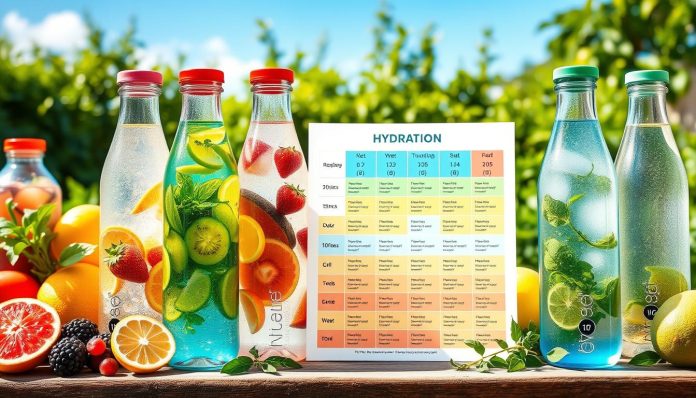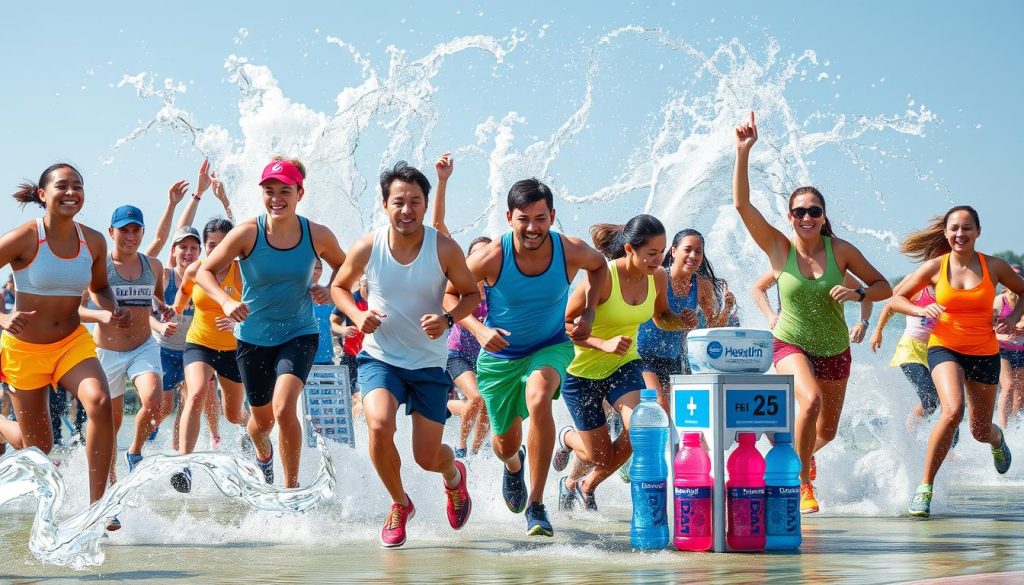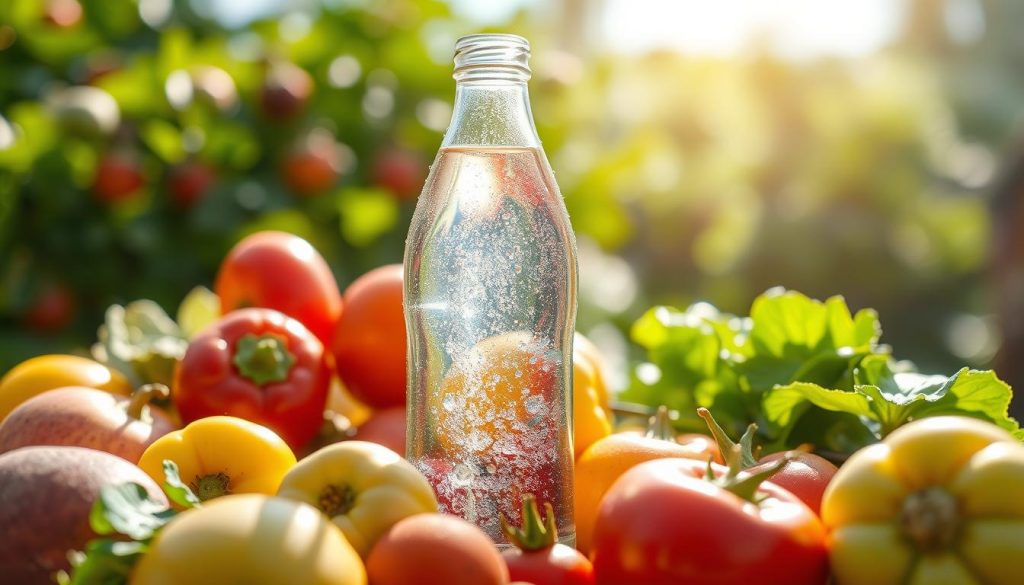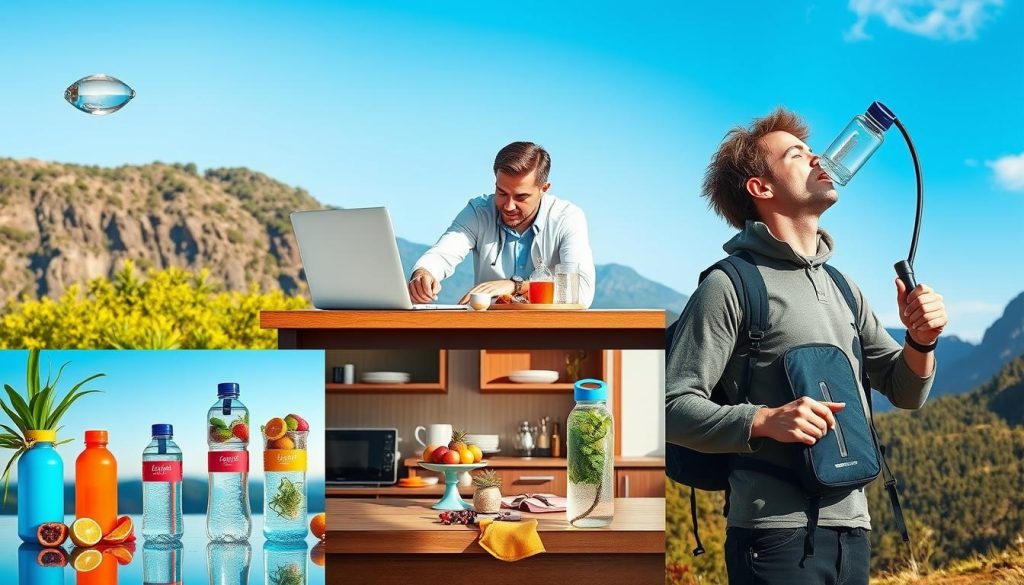Drinking enough water is key to staying healthy and performing well. Even a little dehydration can slow you down. It can even lead to serious health issues. So, it’s important to stay hydrated, whether you’re an athlete or just starting to get active.
It’s not just about drinking water. When and how much you drink matters too. For example, drinking 5-7 milliliters of water per kilogram of body weight 4 hours before exercise helps. Also, if your urine is light, it means you’re drinking enough water. By focusing on hydration, you can do better and avoid dehydration.
Learning to hydrate right is a big step towards better health and performance. It doesn’t matter if you’re a pro athlete or just beginning. Knowing how to hydrate can help you reach your goals. With the right hydration plan, you can stay on top of your game and perform at your best.
Key Takeaways
- Proper hydration is essential for maintaining health and performance
- Hydrating for better performance is critical for athletic success
- Understanding the importance of hydration can help you develop effective hydration tips
- Pre-exercise hydration is critical for staying hydrated during exercise
- Monitoring urine color can indicate hydration status
- Drinking water at the right time and in the right quantity is key to staying hydrated
- Prioritizing hydration can improve performance and reduce the risk of dehydration
Understanding the Importance of Hydration
Drinking enough water is key for our bodies to work right. It helps control body temperature and moves nutrients and waste. Without enough water, our health and performance can suffer.
Water keeps our joints moving smoothly and muscles strong. If we don’t drink enough, we can feel tired and weak. It’s vital to drink water to stay healthy and perform well.
Our bodies are about 60% water, and we need to keep it up to stay healthy. By focusing on hydration, we can keep our bodies working well. This helps us stay healthy and perform at our best.
Why Hydration Matters for Overall Health
Hydration is key for our bodies to function well. When we’re hydrated, we feel our best. It’s important for our overall health and well-being.
Role of Water in Physical Performance
Water helps our bodies move and muscles get oxygen. When we’re hydrated, we can do our best. It also helps prevent injuries and illnesses.
Effects of Dehydration on the Body
Dehydration can cause serious problems, from mild to severe. It can lead to fatigue, headaches, and even heat stroke. It’s important to know the signs and drink enough water to avoid dehydration.
Daily Hydration Needs: How Much Water Should You Drink?
Figuring out how much water athletes need each day can be tricky. Your age, sex, weight, and how active you are all matter. The Institute of Medicine suggests that adult women should drink about 91 ounces of water daily. Adult men should aim for around 125 ounces.
To stay hydrated right, think about your own needs. Athletes, for example, might need to drink more because they sweat a lot during workouts. It’s best to drink water all day, not just in big gulps.
Factors Influencing Water Intake
Many things can affect how much water you need. The weather, how active you are, and your health are all important. For example, people in hot, humid places might need to drink more water. Athletes doing hard workouts also need to replace lost fluids to stay hydrated.
Hydration Guidelines from Health Authorities
Health groups like the U.S. Food and Nutrition Board give advice on drinking water. But remember, everyone’s needs are different. By following good hydration practices and thinking about your own needs, you can make sure you drink enough water. This helps you stay healthy and perform well.
Best Sources of Hydration
Knowing the best ways to stay hydrated is key. Water is the top choice, and you should drink 0.5 to 1 ounce of it per pound of body weight each day. But, milk and juice can also help meet your hydration needs. Plus, hydrating foods like fruits and veggies offer important electrolytes and water.
About 20% of our daily water comes from food, say experts. Foods like cucumbers, iceberg lettuce, and watermelon are full of water. For example, cucumbers and iceberg lettuce have 96% water content. They’re great hydration tips for hot summer days.
If you’re into intense workouts, electrolyte drinks can be a good choice. Dr. Eby suggests drinking water before, during, and after exercise. He also recommends sports drinks for high-intensity workouts lasting over 45 minutes. This shows how hydration is key for better performance and health.
By following these hydration tips, you can make sure you’re getting enough water and electrolytes. This is important for staying hydrated and performing well. Remember, hydrating for better performance is not just for athletes. It’s for anyone wanting to stay healthy and feel their best.
Signs of Dehydration: Are You Getting Enough Water?
It’s vital to stay hydrated for your health. Knowing the signs of dehydration is key to avoiding serious health issues. Dr. Eby says if you feel thirsty, you’re already dehydrated. Other signs include dark yellow urine, feeling tired, and muscle cramps. Drinking enough water is important, but it’s even more critical for athletes to perform well.
Dehydration happens when you lose more fluids than you take in. It can affect your body’s normal functions. Signs include bad breath, less urine, dry mouth, feeling tired, and wanting sweets. Severe symptoms like confusion, dizziness, fainting, and heart palpitations need immediate medical help. Drinking lots of fluids and eating foods with lots of water, like fruits and veggies, helps prevent dehydration.
How much water you need depends on your health, how hard you exercise, and the weather. Not drinking enough, hot weather, too much caffeine or alcohol, and intense exercise can cause dehydration. Athletes can lose a lot of water through sweat, making dehydration a big risk. Knowing the signs and staying hydrated helps keep you healthy and performing well.
Common Symptoms of Dehydration
Dark yellow or amber urine means you need to drink more water. Other signs include feeling tired, dizzy, and wanting sweets. It’s important to notice these signs and act to avoid dehydration, which is critical for people who exercise a lot or live in hot, humid places.
Serious Health Risks of Chronic Dehydration
Long-term dehydration can cause serious problems like kidney damage and heat stroke. Drinking plenty of fluids and eating foods with lots of water helps prevent dehydration. Staying hydrated reduces the risk of chronic diseases and helps athletes perform better, making it a top priority for everyone who exercises regularly.
Staying Hydrated During Exercise and Sports Activities
Staying hydrated is key for athletes to perform well and avoid dehydration. When you exercise, your body loses water and salts through sweat. To stay hydrated, it’s important to use proper hydration techniques and best practices for hydration. Dr. Eby suggests drinking 17 to 20 ounces of water a few hours before you start, and 8 ounces 20 to 30 minutes before or during the warm-up.
It’s vital to drink water often during exercise to replace lost fluids. The American College of Sports Medicine advises drinking 7 to 10 ounces of water every 10 to 20 minutes. After exercising, it’s important to drink 8 ounces of water within 30 minutes. If you’ve been doing high-intensity activities for over an hour, consider a sports drink.
Athletes might need to drink 16 to 24 ounces of water for every pound lost during exercise. It’s also key to watch how your body reacts to exercise and hydration. Symptoms of dehydration can vary from mild to severe. By following these hydration for athletes tips, you can keep your performance up and avoid dehydration and heat-related illnesses.
Hydration Tips for Different Lifestyles
Staying hydrated is key to your health and performance every day. Whether you’re working hard, playing sports, or taking care of kids, hydration tips can boost your energy and focus. Rayven Nairn, M.S., R.D., L.D., says your hydration needs change with age, sex, and how active you are.
To hydrate for better performance, aim for 15.5 cups (3.7 liters) of water daily if you’re a man. Women should aim for 11.5 cups (2.7 liters). But, your needs can change based on your lifestyle and how active you are. For instance, athletes might need more water to replace lost fluids while exercising.
The importance of hydration is huge. It helps your body work right, like keeping temperature stable and moving nutrients to cells. By focusing on hydration and using these tips, you can enhance your health and performance, no matter your lifestyle or activity level.
How to Make Hydration a Habit
It can be tough to make drinking water a habit. But, with the right steps, you can make it a priority. Drinking enough water is key for good health. It’s also vital for athletes to stay hydrated to perform well and avoid dehydration.
Dr. Eby suggests a hydration plan and setting a timer to drink water every 15 to 20 minutes. Keeping a water bottle handy and adding fruit to your water can make it more enjoyable. This way, you get the benefits of hydration without added sugars.
Incorporating Water into Your Daily Routine
Start by drinking water as soon as you wake up. Keep drinking it throughout the day. Women should aim for 11 cups of water daily, while men should aim for 15 cups.
You can also get water from foods like cucumbers, watermelon, and tomatoes. These foods are full of water, helping you stay hydrated.
Strategies for Remembering to Drink Water
Using a hydration app can help you track your water intake. It can also remind you to drink water at set times. Keeping a hydration log can help you see your progress and make changes if needed.
By making hydration a habit, you’ll see many benefits. These include better physical performance, improved brain function, and overall health.
The Role of Electrolytes in Hydration
Electrolytes, like salt and potassium, are key for proper hydration, vital for hydration for athletes. Experts, including Rayven Nairn, say these minerals keep our body’s fluid balance right. Knowing their role helps us see why they’re so important for best practices for hydration.
Eating foods rich in electrolytes, like bananas and avocados, helps keep us hydrated. Also, drinks full of electrolytes are great for athletes who work hard. Remember, everyone’s needs are different. Always talk to a doctor to find the right way to stay hydrated, for hydration for athletes.
Learning about electrolytes and using best practices for hydration daily can boost our health and performance. This is key for athletes who need proper hydration techniques to excel.
Hydration Myths Debunked
There are many myths about staying hydrated. Knowing how to stay hydrated is key for good health and performance. It’s very important for athletes and anyone who is active.
One myth is that you must drink eight 8-ounce glasses of water daily. But, research suggests this isn’t always true. How much water you need depends on your age, sex, weight, and how active you are. It’s important to drink when you feel thirsty.
Common Misconceptions About Hydration
Another myth is that sports drinks are always needed during exercise. But, studies have shown water is enough for most activities. Knowing how to stay hydrated is key, and following the right tips is important.
Evidence-Based Facts About Water Intake
The best way to stay hydrated is to drink when you’re thirsty and eat hydrating foods. Fruits and vegetables can give you up to 20% of your daily water. By following these tips, you can improve your health and performance.
Using Technology to Track Hydration
Staying hydrated is key for health, and tech makes it easy to keep track. Rayven Nairn says tech can help you stay hydrated. It’s vital for athletes to stay hydrated to perform well.
There are many apps to help you drink enough water. They send reminders to drink water all day. You can set them to fit your needs, like how active you are and where you live.
Smart water bottles are another cool way to track hydration. They send your water intake data to your phone. They also remind you to drink water, helping you stay hydrated all day.
Apps that Help Monitor Water Consumption
Apps like Waterlogged and Hydro Coach are great for tracking hydration. They let you set goals and see how you’re doing. These apps help you drink more water and stay hydrated.
Smart Water Bottles: A Modern Solution
Smart water bottles, like Hidrate Spark, track your water intake. They give you real-time data. You can customize them to fit your needs, making hydration easy and convenient.
Conclusion: Staying Hydrated for a Healthier Life
Proper hydration is key for your health and how well you perform. By focusing on hydration tips, you’ll see lasting benefits in your hydrating for better performance.
Being well-hydrated helps your body work right. It keeps your temperature in check, supports your joints, and boosts your brain power. The facts show us – hydration’s importance is huge. Even a little dehydration can harm, so drink plenty of water all day.
Start using these hydration tips every day. Your body will be healthier and more full of energy. Thanks for caring about your hydrating for better performance. Here’s to your health and happiness!
FAQ
Why is hydration important for overall health and performance?
Hydration is key for our bodies to work right. It helps control body temperature and moves nutrients and waste. It also helps muscles get oxygen, which is vital for sports.
Not drinking enough water can hurt your performance. It can even cause serious problems like heat stroke and kidney damage.
How much water should I drink daily?
Finding out how much water you need is tricky. It changes based on your age, sex, weight, and how active you are. The Institute of Medicine has some guidelines, but athletes might need more.
It’s important to think about your own needs and what affects how much water you need.
What are the best sources of hydration?
Water is the top choice for staying hydrated. But, milk, juice, fruits, and veggies also help. They give you water and important salts.
For athletes, electrolyte drinks can be good. But, they should be used carefully.
What are the signs of dehydration?
Dehydration shows in many ways, from mild to severe. You might feel thirsty, have dark yellow urine, or feel really tired. If you don’t drink enough, it can get worse and even cause serious health issues.
How can I stay hydrated during exercise and sports activities?
It’s important to drink water during sports to stay strong and avoid dehydration. There are tips for before, during, and after exercise to help you stay hydrated.
How can I incorporate hydration into my daily routine?
It’s hard to remember to drink water all day. But, there are ways to make it easier. Keep a water bottle with you or set reminders to drink.
What is the role of electrolytes in hydration?
Electrolytes are important for keeping the right balance of fluids in our bodies. They help our bodies work right. Knowing about electrolytes and where to get them can help you stay hydrated.
Are there any myths or misconceptions about hydration?
Yes, there are myths about drinking water that are not true. Knowing the facts about water and hydration can help you understand its importance.
How can technology help me track my hydration?
Technology can help you keep track of how much water you drink. Apps and smart water bottles can monitor your water intake and give tips on staying hydrated.




